In the 21st century, society continues to witness events that violate the inalienable human rights that every individual should have access to from birth. The genocide happening in Gaza Strip, Palestine is being talked about by many but heard by few, an inhumane event where people are dying for unjustifiable reasons. As the violence escalates, I wonder, is it justified to sacrifice the lives of thousands of innocent people with the goal of uprooting the “weeds”? How is it possible that some can sleep soundly knowing that around 50% of Gaza strip population is children, and that they are incessantly bombed and forced to live in one of the largest open-air prisons in the world?
The Gaza Strip, a place only 25 miles long and 7.5 miles wide, is one of the most densely populated areas in the world. The Gazan people face inequalities and issues such as lack of housing, food, water, and electricity. Over 70% are refugees, and lives are being taken away in the blink of an eye, whether it be for political or economic interests.
I will never forget the images of a father carrying the remains of his children in plastic bags, crying in agony in the hope that they would come back to life, or the image of a mother giving her son sea water to drink as a last resort.
It’s a heartbreaking situation, and it’s important for us to listen to the voices of the people who are experiencing this situation. Khaled has lived his entire life in Gaza but was an exchange student in the United States during high school for a short time. Now he is in the United States due to being displaced by the war in Gaza.

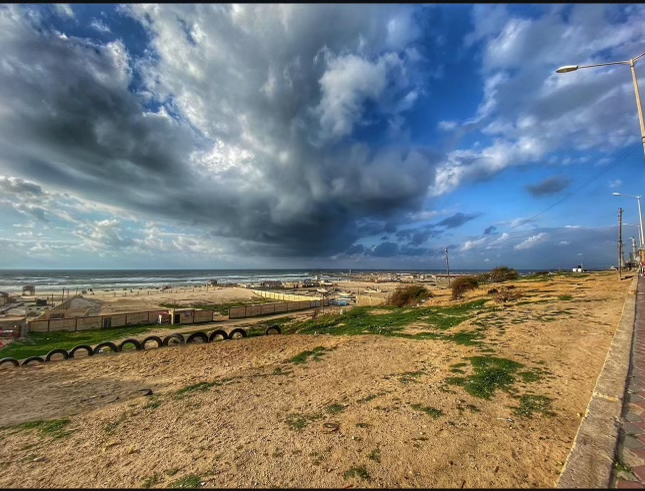
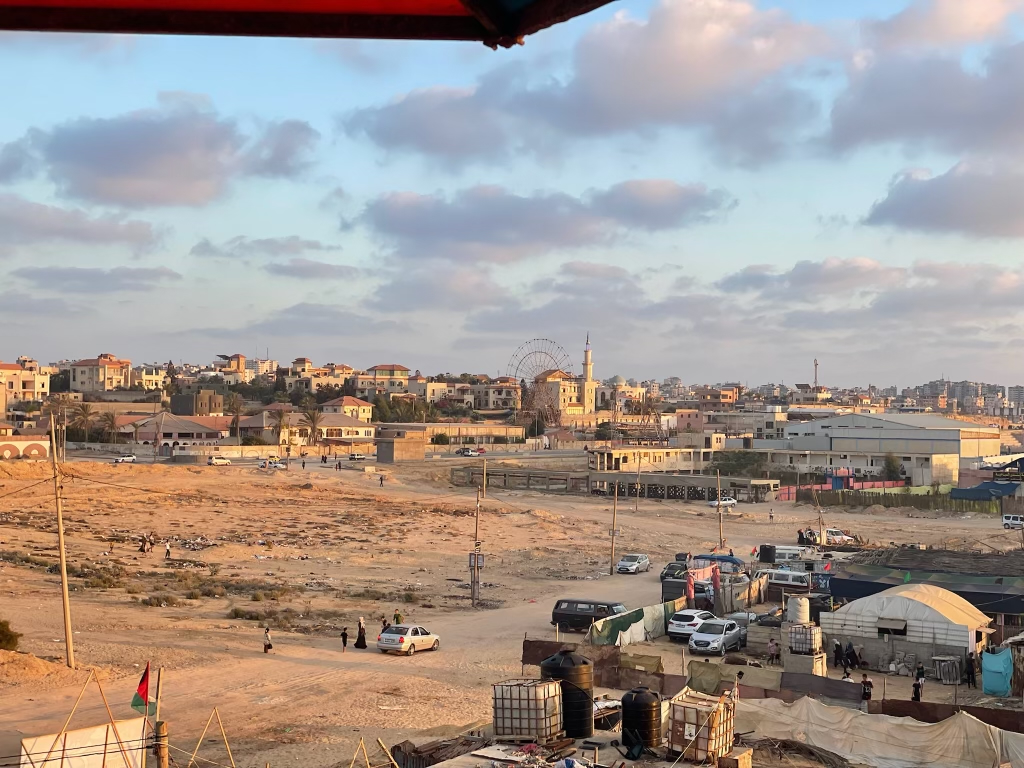


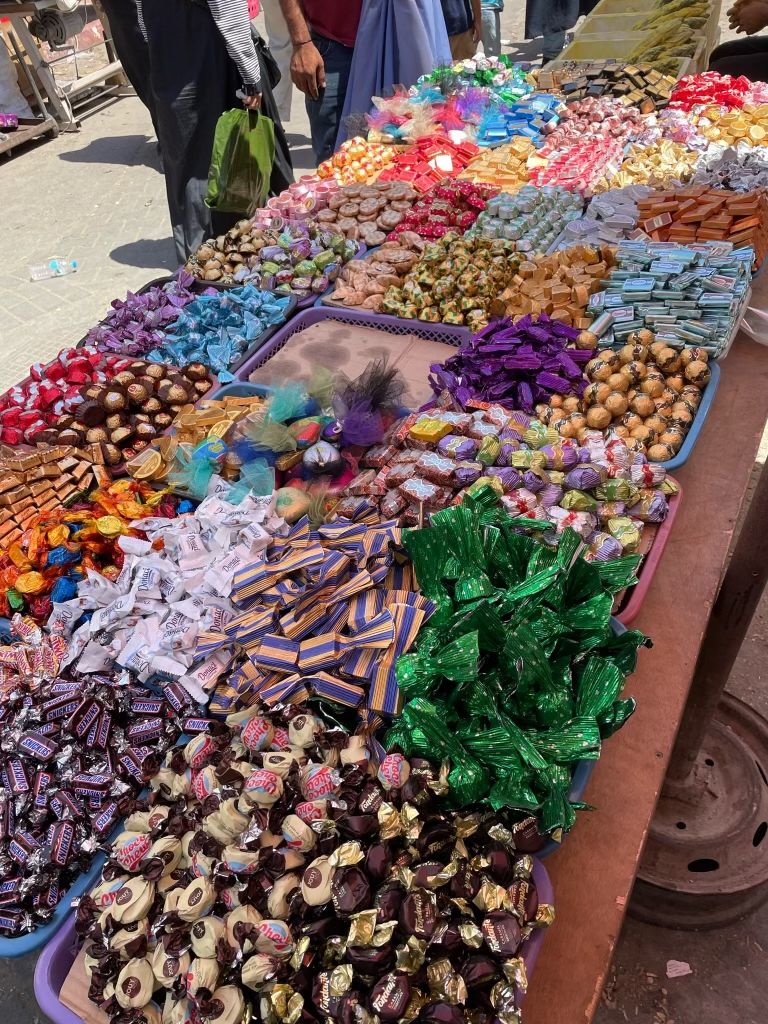
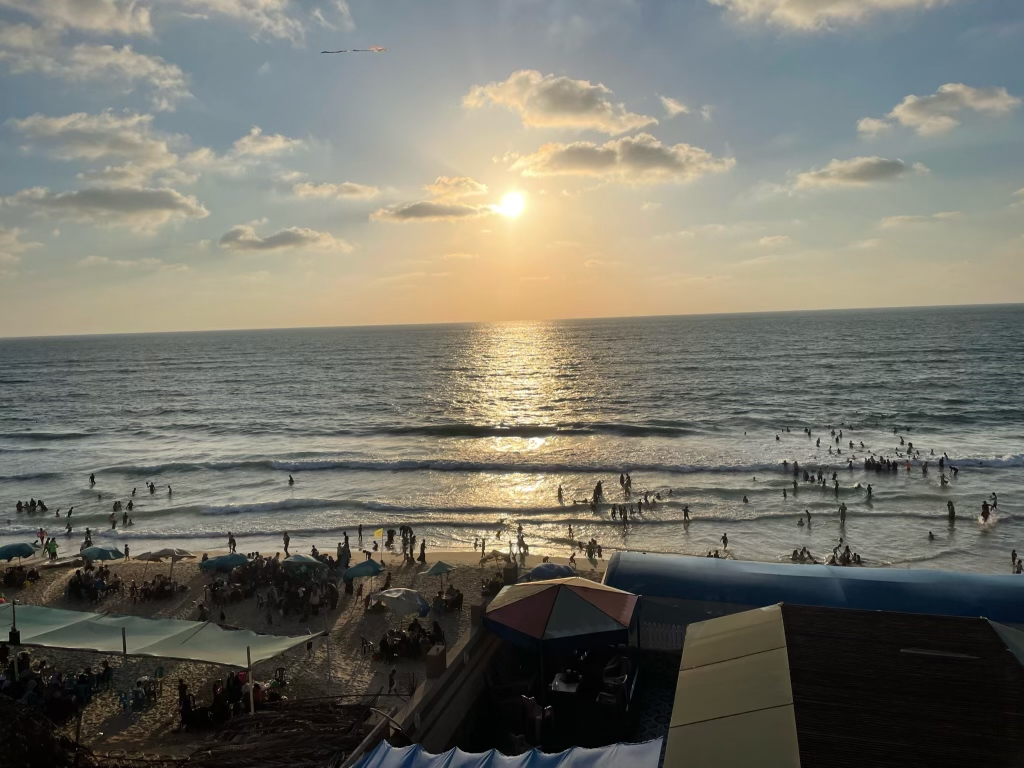
Photos of Gaza, taken by Khaled’s family a year or two before the assault on Gaza began.
Can you tell me about your life back home?
My whole life has been in Gaza. It’s a place that has always faced numerous challenges, like domestic issues and the complex relationship between the government in Gaza, the neighboring governments, and Israel. Palestine, in general, is under occupation.
Gaza’s situation has been quite challenging. In 2006, there were elections and Hamas was democratically elected by the people, leading to their control over Gaza. Since then, Gaza has been under a blockade/siege by Israel and also faces restrictions from Egypt.
Israel controls the borders, including the commercial and civilian ones, while Egypt controls the southern border at Rafah, which allows people to travel to and from Gaza. The situation has always been complicated and challenging. Before 2006, it was a bit easier when the Fatah government was in control. People could go in and out easily. However, after Hamas took over, restrictions were imposed by the global community and Israel, putting Gaza under a blockade.
As a result, many things couldn’t enter Gaza, although some were allowed. Traveling became more difficult, with borders opening only once or twice a month, despite thousands of people wanting to travel.
The other crossing controlled by Israel, called Erez Crossing, requires a special permit from the Israelis. You need to go to Jordan via the Allenby Bridge and then travel to your desired destination in the world. However, obtaining this permit involves a vetting process that takes around 30 to 50 working days, which is like two months. Additionally, to travel to Jordan, you need a Non-Objection Certificate, which is like a visa. So, people have to plan ahead at least two to three months before they can travel. And even as the travel day approaches, they’re not sure if they’ll get the permit or visa to Jordan. I’ve personally experienced this uncertainty before.
I heard about how the state of Israel has been blocking the amount of food that can enter Palestine. How has that affected you?
Before the war, Gaza was under a blockade. But many things were still coming into Gaza, like food and other supplies. We couldn’t say that we were hungry. We used to have almost everything. Certain things couldn’t go into Gaza. Israel claimed they could be considered dual-use, meaning they could be used for civilians or for other purposes. However, since October 7, all the borders were closed and nothing was allowed to enter Gaza. Two to three weeks after the war started, the international community was able to pressure Israel to allow around 35 aid trucks to enter Gaza. To give a perspective of how dire the situation is, Gaza needed 500 trucks of supplies daily in order to fulfill the needs of the community with more international community pressure. More and more aid trucks are being allowed to enter Gaza. It is not enough for everyone, but at least something is getting in. I know from personal experience, I lived in the war for a month.
It was a struggle to get water, food, anything. If you wanted bread, you had to wake up at five in the morning, go to the bakery, stand in long lines for like 4, 6, 7 hours just to get your basic bag of bread. And if you wanted flour to bake, it was even harder. Someone told me that getting gold is easier than getting flour to bake, because it is now very, very scarce. People need food, they need clean water, but that’s not available.
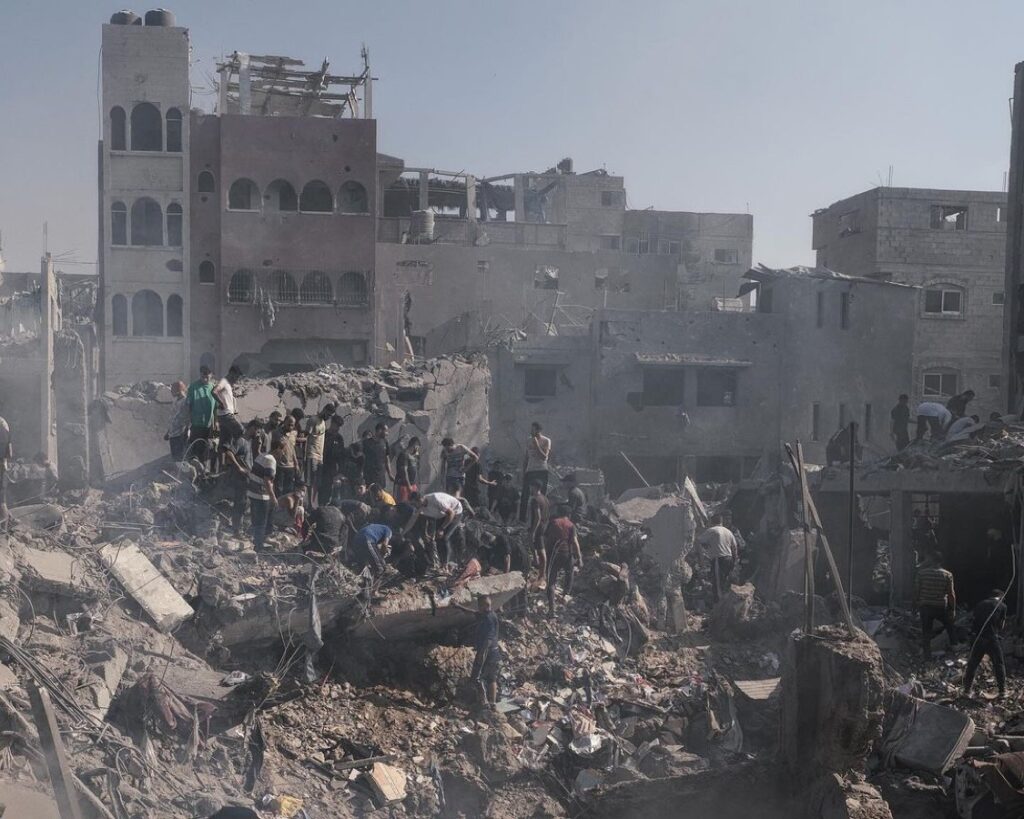
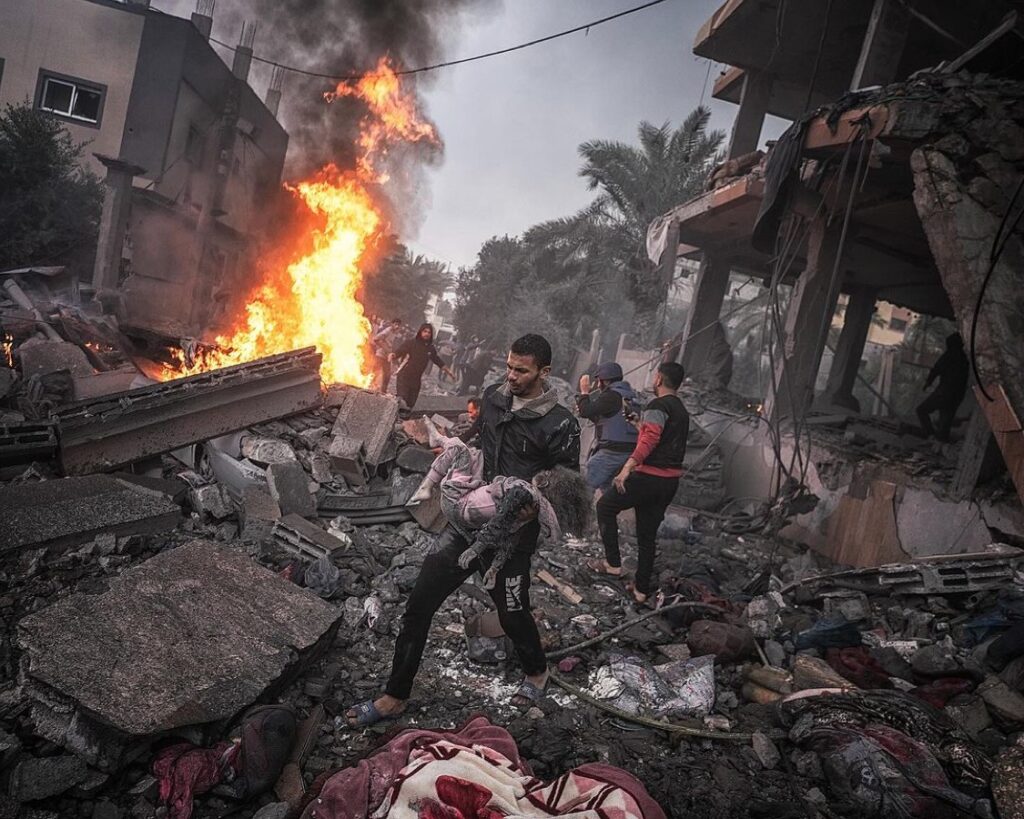
Phots by journalist Motaz Azaiza (on Instagram at @motaz_azaiza)
What hope is your hope at this moment?
Most Gazans had to evacuate their homes in Gaza City and in the north on October 13th. A million and a hundred thousand people were told to evacuate. A lot of them are still in Gaza, but at least half a million or more than that are still in the South. My family and I evacuated and we lived in three different houses in three different areas because we could not all fit in one house.
My mom and my sister live in a house in the south. My brother and his family and two other sisters of mine live in another house. I really worry for them. I fear for their safety. I wake up every day looking at my phone, asking them if they’re okay. Just one message from them means the world to me right now.
I’m not very hopeful, honestly. But I have to hold onto any kind of hope. I also have to pray for their safety every day. When I tell you I have hope, it’s more of a wish that this all ends very soon and we can go back to our homes in Gaza City if it still exists. I can’t speak about hope now. I can only be wishful about them returning back home eventually and them being safe right now.
My apartment, the whole building was hit by a bomb and was leveled to the ground. Even if I go back now, I have to find a new home, start from scratch. It’s a lot to handle. I sincerely hope that my parents and the rest of my family don’t have to go through the same thing. We have a family building where all my relatives live, but I live in a different building, and unfortunately, that was the one that was targeted. It’s really disturbing. I am hopeful that my family can return home and start again.
What is something everyone needs to hear?
People need to see the human side of our stories. They need to see the suffering of the people right now in the Gaza strip to understand we’re living in survival mode under continuous bombings. Death, thirst, and hunger surround us everywhere now. We also have to fight over resources.
There is an American nurse (Emily Callahan) that works for Médecins Sans Frontières (MSF). She worked in Gaza during the war and she recently evacuated and left Gaza to the US. In her interview with CNN, she talks about her experience in Gaza and how bad the situation is. I think watching this interview would be a good starting point for young Americans to get a perspective about the situation. There are also other young journalists who are actively documenting their lives under the war and bombings.
What’s happening is catastrophic. You have 2 million people under death every day. I mean, anything from the world right now makes a difference. Any voice, any kind of support makes a difference for young people to understand more about the occupation of Palestine. They need to not judge Palestinians based on what happened on October 7th. They need to go back 75 years, to1948, when Israel occupied Palestine. That is the root cause of the entire conflict.
They need to understand the whole context of how it started, why there is hate on both sides, and basically the grassroots of why this is all happening so they can understand the October 7th events. Then they can understand how Palestinians and Americans perceive what happened on that day. And they can judge it objectively.
Whatever the reason, on October 7, the response was that more than (as of November 26) 14000 people were killed. More than two third of them are women and children, around 7000 are still missing under the rubble and are unaccounted for. There are more than 30000 people injured.
Anyone with a conscience can’t live their lives when they look at what’s happening in Gaza. I left Gaza on Friday. I stayed in Egypt for three days, then I came to the US. I spent a month in the war in Gaza. I feel extremely guilty for leaving my family behind.Personally speaking, there’s so much guilt, there’s so much pain, so much sadness, so much worry about my family. That’s why I say people need to pay more attention to what’s happening so they can have more empathy at least.
More empathy is the key to this conversation. If only we, as humans, learned to be more empathetic, we could solve past, present, and future conflicts and prevent wars. As Khaled shared, thousands of people are dying, and as witnesses, we have the power to decide whether to simply sit, watch TV, and get on with our lives or to speak up and make a change. Empathy is exactly what the world needs.
